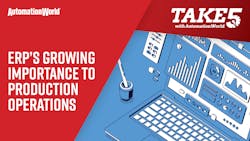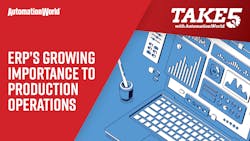ERP’s Growing Importance to Production Operations

Quick hits:
- 20 years ago, most applications of ERP were for financial management uses. Today, ERP is increasingly the connective tissue between the plant floor and executive suite with strong communication in both directions.
- Learn how Trademark Plastics connects everything in its production operations—from injection molding machines and robots to CAD software—to provide real-time alerts, generate data analysis reports, and track materials and status of each project.
- How plant-based food producer TMRW Foods uses its ERP for inventory management, productivity tracking, inspections, data logging, equipment maintenance, dynamic costing, and to ensure consistency of execution at each step—from quality control to purchasing.
Welcome to Take Five with Automation World. I’m David Greenfield, director of content, and in this episode we’ll be looking at the use of enterprise resource planning software—typically referred to as ERP—in production operations.
This software has been around for decades, having evolved from the widely used manufacturing resources planning or MRP software. Because ERP added so many additional capabilities to MRP, such as financial management, human resources, and customer relationship management, it’s often seen more as an executive management tool than as a tool for direct plant floor production management. In fact, in the early 2000s, studies showed only about 10 percent of manufacturers using ERP were using it for anything beyond its financial management features.
But that’s definitely been changing lately, and we’ve published two case studies recently that highlight this. One of these focused on Trademark Plastics, a manufacturer of injection-molded parts for medical device manufacturers, and how it uses ERP to leverage data from its more than 50 production machines.
Data from the machines at Trademark Plastics are fed into the DelmiaWorks ERP system where they’re used to provide real-time alerts and generate some 20 different detailed data analysis reports. Data from the company’s SolidWorks CAD software creates the bills of material used by the ERP to track materials and the status of each project.
Bryan Barrera, chief operating officer at Trademark Plastics, says: Everything is connected into the ERP system here at Trademark, from the material to miscellaneous items to robots, injection molding, and machine information.
With this level of connection, Trademark Plastics can quickly identify potential issues during production using real-time monitoring displays on the shop floor.
David Carty, CEO at Trademark Plastics says: The system can tell you, for example, if you’re scheduled to produce 100 million components per day and your costs, and it’s going to let you know in real time if you’re hitting your goals.
The company also uses DelmiaWorks to track returns. Barrera says: We can say we’re a great supplier because we’re able to show customers and prospects the reports with our metrics from the ERP system.
TMRW Foods is a plant-based food maker that, after creating their first burger prototype in 2019 opened a 5,000-sq-ft production facility in 2020.
For TMRW Foods, the most important requirements of an ERP system was for it to have an easy-to-use production traceability system. But Dean Blignaut, co-founder and president said it was also critical for the company to be able to use its ERP system for Inventory management, productivity tracking, inspections, data logging, equipment maintenance, dynamic costing, and ensuring consistency of execution from quality control to purchasing.
The company ultimately chose an ERP system from Icicle Technologies, which specializes in the food and cannabis industries.
Blignaut said the traceability functionality of the ERP system has been one of its most useful aspects. He said TMRW Foods wanted a really robust tracing system not just to appease regulators, but because they really wanted to know that they could confidently identify any problem in production and report it quickly to whomever might be affected.
Blignaut also likes how they can use the ERP system to do quick remote checks as well. The system allows the company to remotely access data to see if production is running smoothly, if they’re meeting costing expectations, as well as safety and quality checks. He said: It’s a good way for management to know that the team is following the company’s processes, because the long-term goal is that anybody could be removed from the team, including himself, and the system would be able to keep things moving at a high level of execution.
So, I hope you enjoyed this Take Five with Automation World episode. And please keep watching this space for new episodes to keep you on top of what’s happening in the world of industrial automation.

